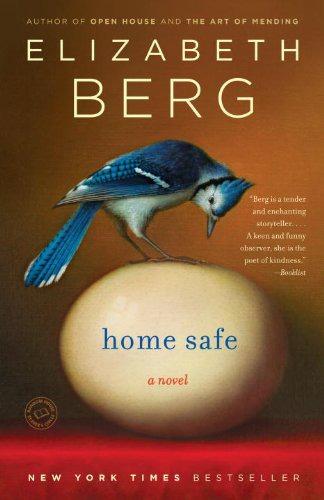
Home Safe
A Novel
کتاب های مرتبط
- اطلاعات
- نقد و بررسی
- دیدگاه کاربران
نقد و بررسی

March 2, 2009
Love, work and the absence of both figure prominently in Berg’s latest, a rumination on loss and replenishment. Since novelist Helen’s husband, Dan, died a year ago, she’s been unable to write, and though her publisher and agent aren’t worried, she is, particularly after a disastrous performance at a public speaking engagement leaves her wondering if her writing career will be another permanent loss. Meanwhile, daughter Tessa is getting impatient as Helen smothers her with awkward motherly affection. Tessa longs for distance and some independence, but Helen is unable to run her suburban Chicago home without continually calling on Tessa to perform the handyman chores that once belonged to Dan. And then Helen discovers Dan had withdrawn a huge chunk of their retirement money, and Helen’s quest to find out what happened turns into a journey of self-discovery and hard-won healing. Berg gracefully renders, in tragic and comic detail, the notions that every life—however blessed—has its share of awful loss, and that even crushed, defeated hearts can be revived.

April 1, 2009
Widow discovers an $850,000 crack in her nest egg in Berg's latest (The Day I Ate Whatever I Wanted, 2008, etc.).
Helen, a bestselling author living in Chicago, is experiencing writer's block for the first time in her life. And no wonder: Her husband Dan died of a heart attack at the breakfast table. Her elderly father has cancer. Phobic about money matters, she's been dodging increasingly frantic calls from her accountant, Steve, and has toyed with taking holiday employment at Anthropologie, even going so far as to interview. A library program director is hounding her to teach a writer's workshop. Toxic fan mail from wannabe writer Margot attacks Helen's body of work as"insipid,""mawkish" and an insult to literature. When Steve finally reaches Helen it's to ask if she has any idea what her husband did with the 850 large he withdrew from the couple's retirement account before his death. Helen had preferred to let Dan handle all the finances, but she had no reason not to trust him. After some promising setups (At 59, would Helen be Anthropologie's oldest cashier? Was squeaky-clean Dan leading a double life?) Berg seems to fall back on her default worldview: Her characters are simply too nice, too timid or both, to get themselves into any interesting messes. Helen sabotages the job interview, and she learns early on (from well-preserved hunky architect Tom) that Dan siphoned off the funds to surprise Helen with the California retirement house of her dreams. The writing class adds the most spice—Helen's arch-rival, a catty novelist, is a co-instructor, and arch-rival-in training Margot brings a masterpiece to the workshop. Otherwise, stock minor players—Helen's skeptical daughter, Tessa, her wise-cracking best girlfriend, Midge, and Tom, a hot romantic prospect (and he's handy too!)—and a plot that ducks every conflict render this outing listless.
Neither insipid nor mawkish but definitely phoned-in.
(COPYRIGHT (2009) KIRKUS REVIEWS/NIELSEN BUSINESS MEDIA, INC. ALL RIGHTS RESERVED.)

March 15, 2009
Eleven months after her husband's sudden death, Helen Ames remains helpless about home repair, ignorant of finances, and stymied by writer's block. Lonely and unsuited to any job outside the home, Helen has nothing to do but exasperate her adult daughter, Tessa, by intruding, until the family accountant calls asking about a secret withdrawal of $850,000 her husband made before dying. The mystery is quickly resolved, but in the meantime, Helen reluctantly agrees to lead an adult writing workshop for pay. The story then proceeds comfortably through Helen's coming to terms with her husband's surprise, her daughter's well-meaning withdrawal, and Helen's journey of self-discoverywith the help of her studentsoutside of her roles as wife, mother, writer. Prolific novelist Berg ("The Day I Ate Whatever I Wanted") is an accomplished master of women's fiction. Her warmth, humor, and forgiving eye for human nature, mixing wry observation with heartwarming moments, make this a pleasant read. Recommended for popular fiction collections. [See Prepub Alert, "LJ" 1/09.]Laurie A. Cavanaugh, Brockton P.L., MA
Copyright 2009 Library Journal, LLC Used with permission.

March 1, 2009
Helen Ames is a popular and prolific writer living in Oak Park, Illinois, much like Elizabeth Berg. But Helen has lost her ability to write. Her inner world is as stunned and hushed as her cherished home in the wake of her husbands sudden death. Dan took care of everything, leaving Helen free to dwell in her imaginary worlds. Now she is bereft and confused. Tessa, her beautiful, patient, funny daughter, a beauty editor at a womans magazine, is trying to help, as is Helens outspoken best friend, Midge. And at least Helen is financially secure. Or not. Where has her money gone? Did Dan have a secret life? Or was he planning a glorious surprise? Berg is a tender and enchanting storyteller who wisely celebrates the simple, sustaining elements of life, from comfort food to birdsong to a good laugh. A keen and funny observer, she is the poet of kindness. And not only is this an insightful, graceful, and romantic novel of one charmingly contradictory womans path through grief, it is also a paean to the profound pleasures and revelations of reading and the adventure and catharsisof writing. Books, Berg affirms in her magical way, are a unifying force for good in the cosmos.(Reprinted with permission of Booklist, copyright 2009, American Library Association.)

























دیدگاه کاربران